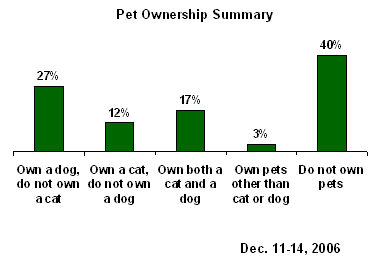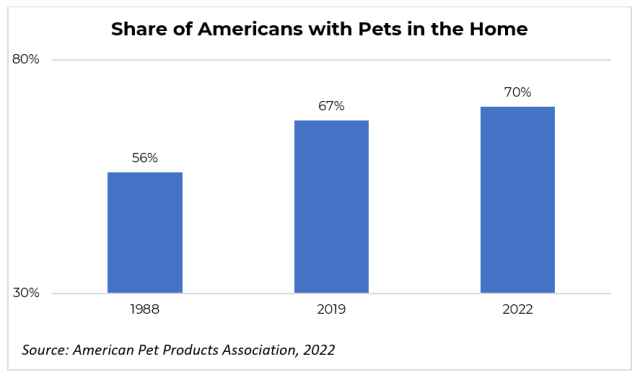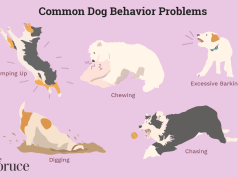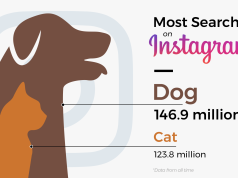Around 85 million households in the US have at least one pet. Pets are an important part of many households in the US, with millions of people owning a furry friend.
According to the American Pet Products Association, around 85 million households in the US have at least one pet. This includes a variety of animals such as cats, dogs, birds, fish, reptiles, and small animals. Pets provide companionship, love, and a sense of responsibility for their owners.
They also offer several health benefits, including reducing stress and improving cardiovascular health. With so many households owning pets, it’s no wonder that the pet industry continues to grow, with new products and services catering to our furry friends’ needs.

Credit: news.gallup.com
Introduction To Pet Ownership In The Us
In the United States, pet ownership is a significant aspect of many people’s lives, as pets bring joy, companionship, and comfort to millions of households. The bond between humans and pets is a cherished and integral part of American culture. Understanding the current trends in pet ownership can provide valuable insights into the impact of pets on society.
The Bond Between Humans And Pets
Pets play a vital role in the lives of their owners, offering unconditional love, companionship, and emotional support. The bond between humans and pets is deeply ingrained in the fabric of American society, with pets being considered as cherished members of the family. This bond transcends mere ownership, as pets provide a sense of purpose, happiness, and comfort to their human counterparts.
A Snapshot Of Pet Ownership Trends
According to recent statistics, approximately 67% of U.S. households, equating to 85 million families, own a pet. Dogs are the most popular choice, with 63.4 million households having at least one canine companion, followed closely by cats, with 42.7 million households enjoying feline company. Additionally, smaller pets such as fish, birds, and reptiles contribute to the diverse landscape of pet ownership in the U.S.

Credit: www.nar.realtor
Surprising Numbers: How Many Americans Own Pets?
When it comes to pets, Americans have a special place in their hearts for these furry companions. Whether it’s a playful pup, a cuddly cat, or a chirpy bird, pets bring joy and love into our lives. But have you ever wondered how many Americans actually own pets?
Total Pet Owners In The Us
In the United States, there are a staggering number of pet owners. According to recent statistics, 85 million households have at least one pet. That’s an astonishing number, considering that the total number of households in the US is around 128 million.
When we break it down, it means that more than 65% of American households have a furry friend by their side. This demonstrates the strong bond that people have with their pets and the importance they place on their companionship.
Comparison With Past Decades
If we compare the current numbers with those from past decades, the increase in pet ownership is remarkable. In the 1980s, around 56% of households had pets. Fast forward to the 2020s, and we see a significant rise in pet ownership, reaching 65%.
This upward trend can be attributed to various factors. The growing awareness of the positive impact that pets have on mental health and overall well-being is one of the key drivers behind this increase. Furthermore, the availability of a wide range of pet-friendly services and products has made it easier than ever for people to welcome a pet into their homes.
Not only do pets provide companionship and emotional support, but they also offer numerous health benefits. Studies have shown that pet owners have lower blood pressure, reduced stress levels, and improved cardiovascular health.
Moreover, pets teach children important life lessons such as responsibility, empathy, and compassion. They become an integral part of the family, bringing joy, laughter, and unconditional love.
In conclusion, the number of Americans owning pets is on the rise, with over 85 million households enjoying the companionship of a furry friend. This increase in pet ownership reflects the deep bond humans have with animals and highlights the positive impact pets have on our lives.
Types Of Pets Americans Love
When it comes to pets, Americans have a soft spot for their furry, scaly, and feathered friends. The types of pets that people love in the US are as diverse as the country itself. Let’s take a closer look at the most popular choices, from the faithful companions to the more unconventional critters.
Dogs And Cats Lead The Pack
Dogs and cats are undoubtedly the top choices for pet ownership in the US. According to the American Pet Products Association (APPA), approximately 67% of US households own a pet, and of these, 63.4 million households have at least one dog. The unconditional love and companionship that dogs and cats provide make them beloved members of the family. Whether it’s the playful nature of a dog or the independent spirit of a cat, these animals have a special place in the hearts of Americans.
Exotic Pets Gaining Popularity
While dogs and cats steal the limelight, exotic pets are gaining popularity among Americans. From reptiles like snakes and lizards to small mammals like hedgehogs and sugar gliders, people are increasingly fascinated by the unique appeal of exotic pets. In fact, the APPA’s National Pet Owners Survey reveals that reptile ownership has increased by 22% since 2019. As more people seek out unconventional companions, the diversity of pets in American households continues to expand.
Regional Variations In Pet Ownership
Pet ownership in the United States varies significantly from region to region. The type of area, whether urban or rural, plays a role in the number of households that have pets. Additionally, some states have higher rates of pet ownership compared to others. Let’s take a closer look at these regional variations.
Urban Vs. Rural: A Comparison
When it comes to pet ownership, there is a noticeable difference between urban and rural areas. In urban regions, where people live in densely populated cities, owning a pet can be more challenging due to limited space. However, despite the constraints, many city dwellers still find ways to accommodate furry friends in their homes.
In contrast, rural areas offer more open spaces and larger yards, making it easier for families to own pets. The rural lifestyle often embraces the companionship and benefits that come with having animals. As a result, pet ownership tends to be more prevalent in these areas.
Moreover, the type of pet can also vary between urban and rural settings. While urban areas may have a higher percentage of cat owners, rural areas often see more households with dogs. The availability of outdoor space and the need for working or guard animals can influence these preferences.
States With The Highest Pet Ownership
Looking at the United States as a whole, some states stand out for their high rates of pet ownership. These states have fostered a culture where pets are cherished members of the family. Here are the top five states with the highest pet ownership:
| Rank | State | Percentage of households with pets |
|---|---|---|
| 1 | Texas | 65% |
| 2 | Florida | 63% |
| 3 | California | 60% |
| 4 | New York | 58% |
| 5 | Pennsylvania | 56% |
These states not only have a high percentage of households with pets but also offer a range of pet-friendly facilities and services. From parks and grooming salons to veterinary clinics, pet owners in these states have access to a thriving pet community.
It’s worth noting that pet ownership is not limited to these states alone. Throughout the country, millions of households welcome pets into their lives, bringing joy, companionship, and many memorable moments.
Impact Of Covid-19 On Pet Adoption
The COVID-19 pandemic has affected many aspects of our lives, including our pets. As people are spending more time at home, they have turned to pets for companionship. In this section, we will explore the surge in pet adoptions during the pandemic and the long-term effects on pet ownership trends.
A Surge In Pet Adoptions During The Pandemic
The pandemic has led to a significant increase in pet adoptions across the United States. According to the American Society for the Prevention of Cruelty to Animals (ASPCA), there was a 70% increase in pet adoptions in 2020 compared to the previous year.
The increase in pet adoptions can be attributed to several factors. First, people are spending more time at home due to lockdowns and remote work. This has given them the opportunity to take care of a pet and provide them with the attention they need. Additionally, the pandemic has increased feelings of loneliness and anxiety, and pets have been a source of comfort for many people.
Long-term Effects On Pet Ownership Trends
The surge in pet adoptions during the pandemic is expected to have long-term effects on pet ownership trends. As people have had more time to bond with their pets, they are more likely to continue to prioritize their pet’s needs even after the pandemic.
Additionally, the pandemic has led to an increase in pet-friendly policies, such as remote work and pet-friendly housing. This is likely to continue even after the pandemic, making it easier for people to own pets.
However, it is important to note that owning a pet is a long-term commitment that requires time, effort, and resources. As the pandemic subsides and people return to their pre-pandemic routines, it is important to ensure that pets continue to receive the care and attention they need.
| Pros | Cons |
|---|---|
| Pets provide companionship and comfort | Owning a pet is a long-term commitment |
| Increase in pet-friendly policies | Pets require time, effort, and resources |
| Pets can improve mental health | Pets can be expensive |
In conclusion, the COVID-19 pandemic has led to a surge in pet adoptions and is expected to have long-term effects on pet ownership trends. While owning a pet can provide companionship and improve mental health, it is important to remember that it is a long-term commitment that requires time, effort, and resources.
Benefits Of Having A Pet
Pets bring numerous benefits to people’s lives, and it’s no wonder that a significant number of individuals in the US have pets. From providing companionship to reducing stress levels, having a pet can enhance overall well-being and bring joy to households across the country.
Pets are more than just furry companions. They bring joy, comfort, and a sense of purpose into our lives. In the US, pets are a popular choice for households with over 67% of households owning at least one pet. But, beyond companionship, owning a pet has numerous emotional and physical health benefits. In this section, we’ll explore the benefits of having a pet, including the role they play in family dynamics, and their positive impact on our physical and emotional health.Emotional And Physical Health Benefits
Pets have a significant impact on our emotional and physical health. Studies have shown that pet owners tend to have lower levels of stress, anxiety, and depression. The simple act of petting a dog or cat can help to lower blood pressure, heart rate, and cortisol levels, which are all indicators of stress. Pets can also help to reduce feelings of loneliness and social isolation, especially in older adults. In addition to the emotional benefits, owning a pet can also have physical health benefits. For example, dog owners tend to be more physically active, as they need to take their dogs for walks and exercise. This increased physical activity can lead to lower rates of obesity, heart disease, and other chronic health conditions.Pets And Their Role In Family Dynamics
Pets play an important role in family dynamics, providing a sense of companionship, responsibility, and unconditional love. For families with children, pets can be a great way to teach responsibility, empathy, and compassion. In fact, studies have shown that children who grow up with pets tend to have higher self-esteem and better social skills. Pets can also help to strengthen family bonds, as they provide a shared experience and a common interest. Whether it’s taking the dog for a walk, playing with the cat, or training a new puppy, pets can bring families together and create lasting memories. In conclusion, owning a pet has numerous benefits, both for our emotional and physical health, as well as our family dynamics. From reducing stress and anxiety to strengthening family bonds, pets are an important part of many households in the US. If you’re considering getting a pet, be sure to do your research and choose the right pet for your lifestyle and family.Challenges Faced By Pet Owners
Pet owners in the US face challenges such as finding pet-friendly accommodation, dealing with pet allergies, and managing the costs of pet care. Despite these challenges, approximately 67% of US households own pets, indicating the widespread love and care for animal companions.
Cost Considerations
One of the challenges faced by pet owners in the United States is the cost associated with owning a pet. Pets require regular expenses such as food, grooming, and healthcare. In addition, there are other costs that pet owners need to consider, such as pet insurance, training, and boarding when they go on vacation. These expenses can quickly add up, making it important for pet owners to budget and plan accordingly.
Addressing Pet Health Issues
Pet health is another significant concern for pet owners. Just like humans, pets can face a wide range of health issues, including allergies, infections, and chronic conditions. It’s essential for pet owners to provide regular veterinary care, including vaccinations and routine check-ups, to ensure their pets stay healthy. Additionally, pet owners should be prepared for unexpected health issues that may arise, as emergency veterinary care can be costly.
Ensuring Proper Nutrition
Proper nutrition is vital for the well-being of pets. Pet owners need to ensure they are feeding their pets a balanced diet that meets their specific nutritional needs. This means researching and selecting the right type of food for their pet, whether it’s dry kibble, wet food, or a raw diet. It’s also important to monitor portion sizes to prevent overfeeding and obesity, as obesity can lead to a variety of health problems in pets.
Providing Adequate Exercise And Mental Stimulation
Pets need regular exercise and mental stimulation to thrive. Lack of exercise can lead to weight gain, behavioral issues, and overall poor health. Pet owners should provide their pets with opportunities for physical activity, whether it’s through walks, playtime, or interactive toys. Additionally, mental stimulation is important to keep pets engaged and prevent boredom. This can be achieved through puzzle toys, training sessions, and social interaction with other animals or humans.
Maintaining A Safe Environment
Creating a safe environment is crucial for the well-being of pets. Pet owners should pet-proof their homes by removing any potential hazards that could harm their pets, such as toxic plants, chemicals, or small objects that could be swallowed. It’s also important to provide a secure and enclosed outdoor space for pets to prevent them from wandering off or getting injured. Regularly inspecting the home and yard for potential dangers is essential to ensure the safety of pets.
Building A Strong Bond
A strong bond between a pet and its owner is essential for a happy and fulfilling relationship. Pet owners should spend quality time with their pets, providing them with love, attention, and positive reinforcement. This helps create a sense of trust and companionship, which can significantly improve the overall well-being of both the pet and the owner.

Credit: spots.com
Future Trends In Pet Ownership
Pet ownership in the US is on the rise, with approximately 67% of households having at least one pet. This trend is expected to continue, driven by factors such as companionship, mental health benefits, and the increasing number of pet-friendly accommodations and workplaces.
As more people recognize the positive impact of pets on their lives, the future of pet ownership looks promising.
Technological Advancements In Pet Care
Technology is revolutionizing the way we care for our pets. From advanced tracking devices to smart feeding systems, pet owners are embracing innovative solutions to ensure the well-being of their furry companions. Artificial intelligence and machine learning are being integrated into pet care products, allowing for personalized and efficient care tailored to each pet’s unique needs.
Predictions For The Next Decade
- Rising Adoption Rates: With the increasing awareness of the benefits of pet ownership, the number of households with pets is expected to rise steadily.
- Health and Wellness Focus: There will be a significant shift towards preventive healthcare for pets, with a focus on nutrition, exercise, and mental well-being.
- Environmental Sustainability: Pet owners will seek eco-friendly products and sustainable pet care solutions, driving the demand for environmentally conscious pet industry innovations.
Frequently Asked Questions
How Many People’s Households In The Us Own More Than One Pet?
In the US, many households own more than one pet. The exact number of households is unknown, but it is common for people to have multiple pets.
Are There More Pets Than Children In The Us?
No, there are more children than pets in the US. According to the American Veterinary Medical Association, about 38% of US households own at least one dog and 25% own at least one cat. In comparison, there are approximately 73 million children under the age of 18 in the US.
How Many Pets In The Us Are Homeless?
In the US, it’s estimated that around 6. 5 million pets are homeless. These include cats and dogs that are living in animal shelters, on the streets, or with rescue organizations. This number highlights the importance of adopting pets and supporting animal welfare organizations.
What State Has The Most Pet Owners?
California has the highest number of pet owners in the United States.
Conclusion
Pets have become an integral part of many households in the US, providing companionship and emotional support. The number of people who own pets is staggering, highlighting the significance of these furry friends in our lives. As pet ownership continues to rise, it’s crucial for individuals to understand the responsibilities and benefits that come with it.
Whether it’s a cat, dog, or any other beloved pet, the bond between humans and animals is undeniable. So, let’s cherish and care for our pets, and enjoy the unconditional love they bring into our lives.








